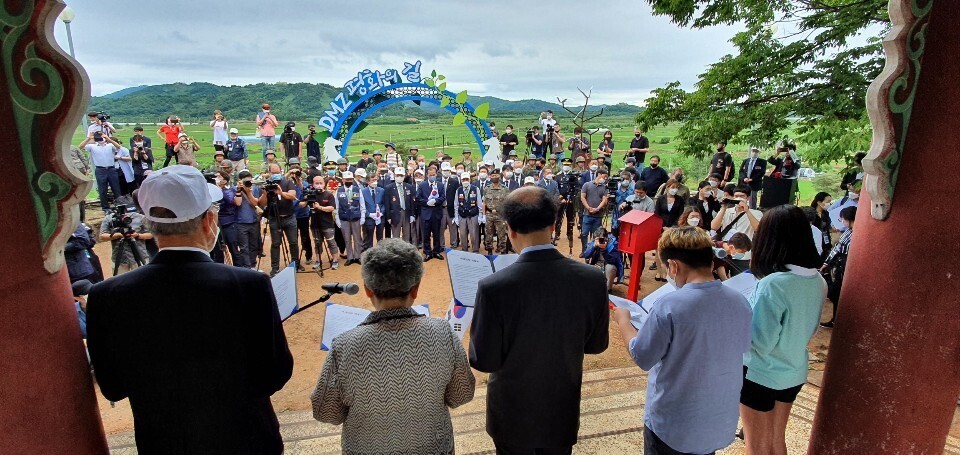hankyoreh
Links to other country sites 다른 나라 사이트 링크
People throughout S. Korea call for peace on 70th anniversary of Korean War’s outbreak

June 25, the 70th anniversary of the outbreak of the Korean War (1950-53), saw an array of voices calling for peace on the Korean Peninsula in churches around the country and in locations that still carry the scars of the war. People expressed concerns about the recent escalation in inter-Korean tensions and were united in the view that war must never again occur in Korea.
At Baengmagoji (White Horse Hill) in Cheolwon County, Gangwon Province, the backdrop to one of the bloodiest battles of the war, a “Statement Wishing for an End to the War” was publicly announced that expressed hope for peace on the Korean Peninsula. Adding to the meaning of the occasion, the statement was written by Jo Jung-rae, the author of Taebaek Mountain Range, an iconic work of literature on post-liberation Korea and the country’s division.
A memorial service for the 70th anniversary of the Korean War was held in Cheolwon on the day under the theme of “From Memories to Hope, Together” with 400 attendees including Jo, war veterans, and students who read the “Statement Wishing for an End to the War on the Korean Peninsula” in chorus. The statement included descriptions of the pain caused by division, a wish for peaceful coexistence and joint prosperity, and a call [for North Korea] to cooperate for the sake of achieving lasting peace on the Korean Peninsula. Written in the form of a letter, the document will be sent to North Korean leader Kim Jong-un through channels such as the Ministry of Unification (MOU) or inter-Korean sporting organizations.
A series of masses dedicated to peace on the Korean Peninsula were also held in Catholic churches across the country. At Myeongdong Cathedral, home of the Seoul National University parish, Cardinal Andrew Yeom Soo-jung presided over a service in which he mentioned the rapidly deteriorating state of inter-Korean relations. “It is very difficult to achieve true peace, but it is not impossible,” he noted. “When we practice ‘politics of forgiveness,’ justice takes on a more humane face and peace becomes more permanent.”
An exhibition of installation art calling for peace also opened on June 25 in Nogeun Village Peace Park, a place that still harbors the pain of the Korean War. The exhibition, arranged by the North Chungcheong Province Folk Art Collective and North Chungcheong Province Ethnic Art Association to commemorate the war’s 70th anniversary, will run until the end of July. Nogeunri Peace Park was created in front of the railway bridge on the Gyeongbu Line in Nogeun Village, Hwanggan Township, Yeongdong County, North Chungcheong Province, where several hundred people were killed by US Army shells from July 25-29, 1950, during the early stages of the war. At the time, a government survey confirmed that 226 were killed, leaving behind 2,240 bereaved family members.
By Park Soo-hyuk, Gangwon correspondent, and Oh Yoon-joo, Cheongju correspondent
Please direct comments or questions to [english@hani.co.kr]

Editorial・opinion
![[Guest essay] The real reason Korea’s new right wants to dub Rhee a founding father [Guest essay] The real reason Korea’s new right wants to dub Rhee a founding father](https://flexible.img.hani.co.kr/flexible/normal/500/300/imgdb/original/2024/0423/8317138574257878.jpg) [Guest essay] The real reason Korea’s new right wants to dub Rhee a founding father
[Guest essay] The real reason Korea’s new right wants to dub Rhee a founding father![[Column] ‘Choson’: Is it time we start referring to N. Korea in its own terms? [Column] ‘Choson’: Is it time we start referring to N. Korea in its own terms?](https://flexible.img.hani.co.kr/flexible/normal/500/300/imgdb/original/2024/0423/3617138579390322.jpg) [Column] ‘Choson’: Is it time we start referring to N. Korea in its own terms?
[Column] ‘Choson’: Is it time we start referring to N. Korea in its own terms?- [Editorial] Japan’s rewriting of history with Korea has gone too far
- [Column] The president’s questionable capacity for dialogue
- [Column] Are chaebol firms just pizza pies for families to divvy up as they please?
- [Column] Has Korea, too, crossed the Rubicon on China?
- [Correspondent’s column] In Japan’s alliance with US, echoes of its past alliances with UK
- [Editorial] Does Yoon think the Korean public is wrong?
- [Editorial] As it bolsters its alliance with US, Japan must be accountable for past
- [Guest essay] Amending the Constitution is Yoon’s key to leaving office in public’s good graces
Most viewed articles
- 1[Column] ‘Choson’: Is it time we start referring to N. Korea in its own terms?
- 2Senior doctors cut hours, prepare to resign as government refuses to scrap medical reform plan
- 3[Guest essay] The real reason Korea’s new right wants to dub Rhee a founding father
- 4Why Korea shouldn’t welcome Japan’s newly beefed up defense cooperation with US
- 5Opposition calls Yoon’s chief of staff appointment a ‘slap in the face’
- 6New AI-based translation tools make their way into everyday life in Korea
- 7Terry Anderson, AP reporter who informed world of massacre in Gwangju, dies at 76
- 8[Column] The clock is ticking for Korea’s first lady
- 9Samsung barricades office as unionized workers strike for better conditions
- 10Korean government’s compromise plan for medical reform swiftly rejected by doctors